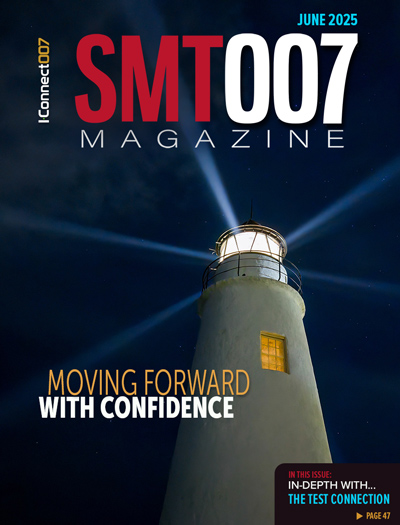-

- News
- Books
Featured Books
- smt007 Magazine
Latest Issues
Current Issue
Supply Chain Strategies
A successful brand is built on strong customer relationships—anchored by a well-orchestrated supply chain at its core. This month, we look at how managing your supply chain directly influences customer perception.

What's Your Sweet Spot?
Are you in a niche that’s growing or shrinking? Is it time to reassess and refocus? We spotlight companies thriving by redefining or reinforcing their niche. What are their insights?

Moving Forward With Confidence
In this issue, we focus on sales and quoting, workforce training, new IPC leadership in the U.S. and Canada, the effects of tariffs, CFX standards, and much more—all designed to provide perspective as you move through the cloud bank of today's shifting economic market.
- Articles
- Columns
- Links
- Media kit
||| MENU - smt007 Magazine
U.S. Electronics Manufacturers Grappling With Higher Costs from U.S. and Chinese Tariffs
October 23, 2019 | IPCEstimated reading time: 1 minute
Almost 90 percent of U.S. electronics manufacturers are troubled by the higher tariffs imposed by the United States and China on each other’s imports, and some are investing less in the United States and hiring fewer workers as a result.
These are among the results of a survey conducted by IPC, a global association representing the electronics manufacturing industry, which queried its U.S. members between September 25 and October 2, 2019. Among the survey results:
- On average, companies report they have seen tariff increases on 31 percent of the total dollar value of the products they import. Twenty-five percent of companies report over half of the dollar value of the products they import are facing higher tariffs.
- Some 69 percent of companies report lower profit margins as a result of increased tariffs, with a ripple effect of negative consequences: 21 percent report they are reducing investment in the United States, and 13 percent say they are cutting back on hiring and/or reducing headcount.
- More than a third of companies report they cannot increase their prices to cover the cost of higher import tariffs, due to various factors.
- Fifty-one percent of responding companies report they are now sourcing from countries other than China as a result of increased tariffs on Chinese imports.
“As the IPC research documents, rising tariffs are putting a painful squeeze on many U.S. electronics manufacturers,” said IPC Chief Economist Shawn DuBravac. “Many are facing supply-chain disruptions and steeper costs from the tariffs that have been imposed to date, and the impacts will grow as the trade war drags on.”
“Our industry has longstanding concerns about some of China’s industrial policies, including government subsidies and intellectual property violations,” said IPC President and CEO John Mitchell. “But addressing unfair trade practices by ratcheting up tariffs is like using a sledgehammer to make orange juice. In both cases, it’s the wrong tool and makes a mess of the job."
"We call on the governments of the United States and China to de-escalate the tariffs, focus on results at the negotiating table, and conclude agreements that address long-standing issues of concern to both sides," Mitchell said. "We also call on all members of the World Trade Organization to restore that body’s ability to play its role as arbiter of international trade disputes, so that nations won’t feel a need to resort to tariffs to resolve trade disputes,"
Testimonial
"The I-Connect007 team is outstanding—kind, responsive, and a true marketing partner. Their design team created fresh, eye-catching ads, and their editorial support polished our content to let our brand shine. Thank you all! "
Sweeney Ng - CEE PCBSuggested Items
Standard of Friendship: Debbie McDade and Symon Franklin Went From Classmates to Colleagues
08/27/2025 | Debbie McDade, Advanced Rework Technology Ltd.As a fairly new IPC Master Trainer, I nervously attended my first IPC committee meeting in 2002 in New Orleans—a 4,600-mile trip from my home in the UK—for the IPC-610 Task Group. With more than 250 members, it was the largest IPC committee at that time.
Flexible Circuit Technologies to Host Free Flex Heater Webinar
08/18/2025 | Flexible Circuit TechnologiesGlobal Supplier of flexible circuits, flex design services, and assembly/box-build services, Flexible Circuit Technology will host their latest webinar, "Thermal Precision Meets Flexibility: The Technology Behind Heater Circuits" on Tuesday, August 26th, 2025 at 11 AM EDT.
A.R.T. Ltd. Nominated in Four Categories at 2025 Instrumentation and Electronics Industry Awards
08/11/2025 | A.R.T. Ltd.Advanced Rework Technology Ltd. (A.R.T. Ltd.), a leading provider of electronics training and consultancy, has been shortlisted in four categories at the 2025 Instrumentation and Electronics Industry Awards, including Industry Personality, Academic Support, Rising Star, and Best Customer Service.
EMC Taiwan Receives IPC-4101 Qualified Products Listing Certification
08/08/2025 | Global Electronics AssociationIPC’s Validation Services Program has awarded an IPC-4101 Qualified Products Listing (QPL) to Elite Materials Co. (EMC), an electronics base material manufacturing company headquartered in Taoyuan City, Taiwan.
Global Excellence in PCB Design: The Global Electronics Association Expands to Italy
08/07/2025 | Global Electronics AssociationIn today's rapidly evolving electronics industry, printed circuit boards (PCBs) serve as the critical backbone influencing the success, reliability, and time-to-market of countless products. Recognizing this essential role, the Global Electronics Association (formerly IPC), a worldwide leader in electronics standards, certification, and education, is now expanding its internationally acclaimed PCB design training to Italy.


